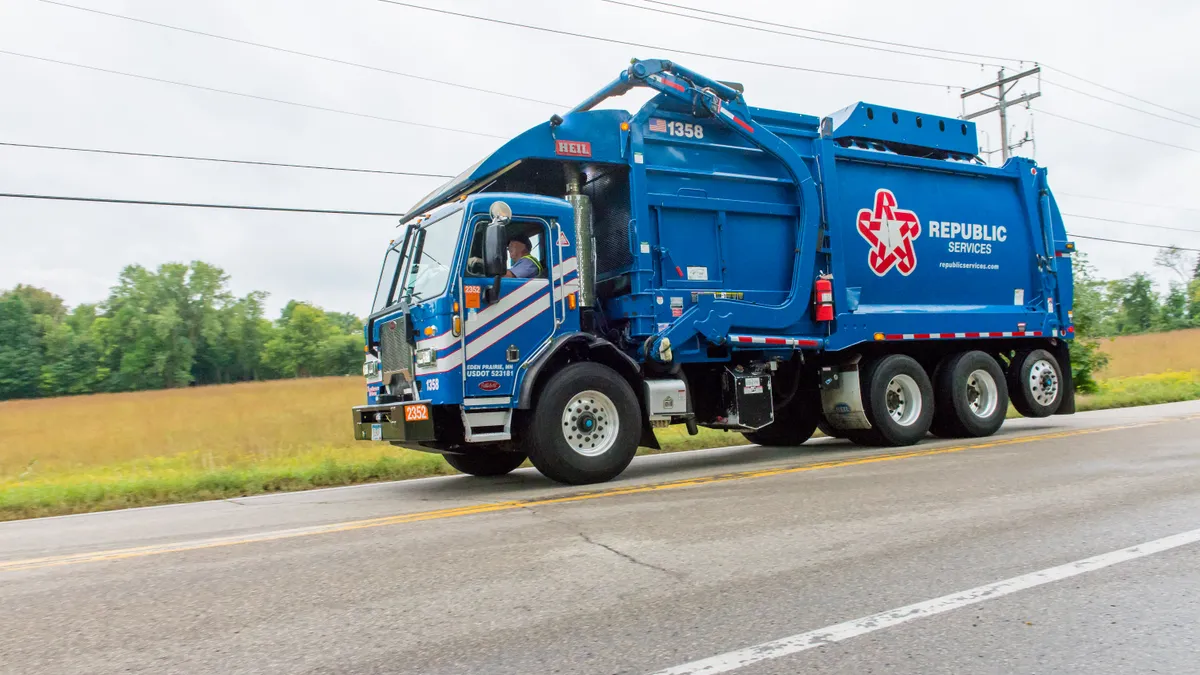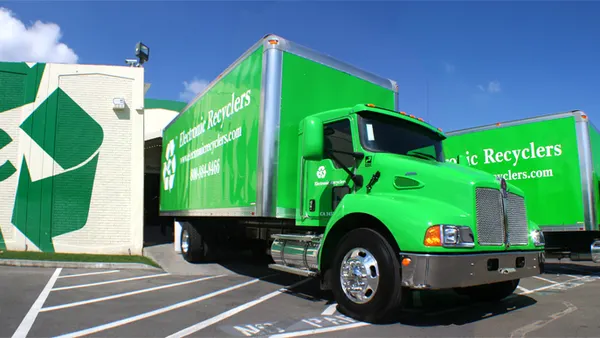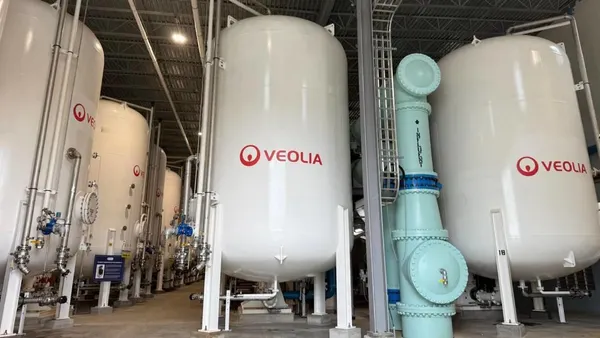As pay for the solid waste industry's top CEOs continued to grow in 2020, shareholders at Republic Services recently voted against efforts to change the company's executive compensation plans.
Amid an otherwise uneventful season of shareholder meetings for the industry's publicly traded companies so far, Republic encountered two notable efforts by the International Brotherhood of Teamsters at its annual shareholder meeting last week.
The first was a resolution about incorporating environmental, social and corporate governance (ESG) metrics into executive compensation plans. The second was a push to vote against the company's compensation plans for executive officers. When excluding broker non-votes, the ESG proposal failed with 14% support. The executive compensation proposal was approved with nearly 92% support.
Republic declined to comment on the outcomes and the Teamsters didn't have an immediate reaction to the final tally.
Speaking ahead of the vote, Michael Pryce-Jones, senior governance analyst with the Teamsters, said the ESG proposal is related to broader discussions happening at many public companies in recent years.
“This is a trend well beyond the Teamsters. Companies are adopting this on their own behalf, at the behest of shareholders," he said. “What we’ve seen over the last year both in the pandemic, racial justice, and then obviously the background of environment concerns, is just a kind of tipping point where folks are more concerned about stakeholder issues than they were previously."
In this case, the Teamsters-backed resolution called on Republic's board of directors to report to shareholders on "if, and how, it plans to integrate [ESG] metrics into the performance measures of named executive officers" under incentive plans. The union noted ESG metrics are factored into executive compensation plans among many of Republic's large industry peers. It also cited a 2019 Mercer study which found 30% of North American company respondents were factoring ESG into their compensation plans.
While ESG-related initiatives such as better safety rates or more investment in alternative fuel collection vehicles tend to also drive higher shareholder returns, it's not always simple to quantify them. Tracking precisely how ESG metrics are factored into compensation at peer companies can be challenging, according to an analyst who follows the solid waste sector, because these results may fall into broader areas such as free cash flow generation or related categories.
Outside groups that track related proposals across many public companies, including As You Sow and Proxy Impact, were not available for comment.
Republic's argument against the ESG proposal was its board already takes these factors into account, pointing to its 2030 sustainability goals as an example of industry leadership.
"Our commitment to sustainability is embedded in our Company strategy, our three-year plans, and tied to performance expectations of management. We are confident that this approach adequately holds management accountable to prioritizing sustainability in our business practices," the company said in a recent proxy filing.
In an official response, the Teamsters said Republic's goals are "laudable" but its approach means "ESG is supposedly everywhere, but is in fact nowhere in particular, with ESG performance ultimately at risk of being marginalized or drowned out." The union specifically took issue with the company's emphasis on pandemic actions by highlighting concerns about a lack of adequate personal protective equipment (a point the company has previously disputed). It described estimated $500 employee bonuses as insufficient, noting this amounted to less than half of compensation for named executives in 2020.
This issue also came up in the union's push to vote against Republic's broader executive compensation plan. Such "say on pay" votes are non-binding, but they have become an opportunity to put pressure on companies in recent years. This year, say on pay resolutions have been voted down by shareholders at major companies including GE, AT&T, Starbucks, XPO Logistics and Marathon Petroleum, among others.
In Republic's case, the Teamsters took issue with the decision to waive a 12-month retirement notice period for outgoing CEO Don Slager (allowing him to keep millions more in equity awards) and maintain his base salary throughout the year despite a planned exit from the role next month.
"CEOs always get generous packages but it’s the supercharging of them at the discretion of the board which upsets shareholders," said Pryce-Jones. “You’ve paid him hundreds of millions of dollars over the years."
The Teamsters initially had support on this issue from Institutional Shareholder Services, but said the leading proxy advisory firm reversed course at the last minute. ISS declined to comment, but Republic confirmed the shift.
Solid waste industry trends
The following compensation breakdowns are ranked in order of each company's total annual revenue.
GFL Environmental is excluded from the initial chart for comparison purposes because its financial information is reported in Canadian dollars.
Waste Management President and CEO Jim Fish
-
Base salary: $1,269,231 (the filing notes Fish donated $100,000 of his 2020 salary, “to fund a scholarship program for children of Company employees.”)
-
Stock awards, option awards, non-equity incentive plan compensation and all other compensation: $11,104,694
-
Total 2020 compensation: $12,373,925
Republic Services CEO Don Slager
-
Base salary: $1,204,058
-
Stock awards, non-equity incentive plan compensation and all other compensation: $11,733,105
-
Total 2020 compensation: $12,937,163
Waste Connections President and CEO Worthing Jackman
-
Base salary: $888,462
-
Share-based awards, non-equity incentive plan compensation and all other compensation: $4,150,859
-
Total 2020 compensation: $5,039,321
GFL Environmental President and CEO Patrick Dovigi
Canadian dollars
-
Base salary: $2,027,342
-
Option-based awards, annual incentive plan and all other compensation: $35,281,180
-
Total 2020 compensation: $37,308,522
Covanta Former President and CEO Stephen Jones
-
Base salary: $744,522
-
Stock awards, non-equity incentive plan compensation and all other compensation: $4,748,494
-
Total 2020 compensation: $5,493,016
-
Total value of separation agreement after leaving company in October 2020: $8,584,877
Covanta President and CEO Michael Ranger
-
Stock awards: $1,715,034
-
Total 2020 compensation: $1,715,035
Casella Waste Systems Chairman and CEO John Casella
-
Base salary: $610,000
-
Stock awards, non-equity incentive plan compensation and all other compensation: $3,184,238
-
Total 2020 compensation: $3,794,238
While the pandemic had an initial effect on financial results last year, and Covanta's former CEO took a temporary pay cut, companies gradually rebounded along with their stock prices. Because executive pay is often tied in large part to stock performance and other metrics, the trend of rising CEO salaries continued for the waste and recycling industry in 2020.
During the period outlined in the chart below, Fish started as chief financial officer before moving to president in July 2016 and CEO in November 2016. Jackman started the period as executive president and CFO, later moving to president in July 2018 and CEO in July 2019. Jones started with Covanta as president and CEO in January 2015, and later departed in October 2020. Current Covanta CEO Michael Ranger is not included on the chart because of his short time in the role to date.
Outside of the solid waste industry, some companies did see CEO pay decline during 2020 due to pandemic complications. Within the largest companies by revenue, according to Equilar research, median CEO pay in the U.S. may have actually declined for the first time in years. Meanwhile, the pay ratio between median employees and CEOs appears to have continued growing wider.
Since Dec. 31, 2017, all U.S. public companies have been required to contrast CEO compensation with that of a selected “median employee." The Economic Policy Institute found the average pay ratio was 320:1 in 2019, up substantially from 61:1 in 1989 and lower ratios before that. President Joe Biden cited this statistic in remarks to Congress last month as part of a broader discussion on raising corporate tax rates. In March, multiple Democratic members of Congress also introduced a bill that would raise taxes on companies with ratios above 50:1.
The pay gap between median employees and most solid waste company CEOs similarly grew between 2019 and 2020.
| CEO | CEO Pay | Median Employee Pay | 2020 Pay Ratio | 2019 Pay Ratio | |
| Waste Management | Jim Fish | $12.4M | $80,091 | 154:1 | 149:1 |
| Republic Services | Don Slager | $12.9M | $65,475 | 198:1 | 197:1 |
| Waste Connections | Worthing Jackman | $5M | $58,559 | 86:1 | 61.5:1 |
| Casella Waste Systems | John Casella | $3.8M | $57,188 | 66:1 | 47:1 |
GFL Environmental is excluded from the chart because it is not required to publish this information as a Canadian company. Covanta is excluded from the chart because its pay ratio was calculated based on compensation for Michael Ranger, who did not become CEO until October 2020.












